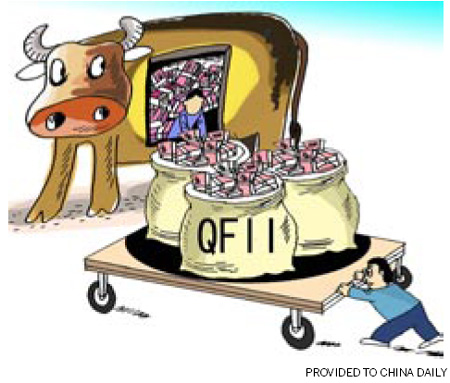Focus
Foreign investment program makes positive progress
Updated: 2011-06-10 11:00
By Ba Shusong (China Daily)

Beijing - Domestic financial markets have experienced rapid development in the eight years since the qualified foreign institutional investors (QFII) program was introduced in China. By creating a strong mutual fund, China's weak domestic financial market has benefited from a strong competitor, also known as the catfish effect.
QFII allows foreign investors to buy and sell yuan-denominated bonds on the Shanghai and Shenzhen stock exchanges. The program allows foreign investors, with approval from regulators, to transfer non-yuan currency into yuan to invest in China's capital market.
In 2003, when QFII was introduced, domestic stock market investors did not fully understand the philosophy behind investing.
The new program offered more ways to invest in stocks, such as value investing, which is purchasing stocks that trade for less than what they are worth.
In the beginning, QFII purchased more long-term, lower-risk stocks, creating a lull in returns. But over time, the portfolio has shifted to both low- and high-risk stocks. The fund reflects more of a prudent investment style, which takes into consideration its investors when buying stocks.
QFII does hold some high-risk stocks, but these types of stocks tend to be bought and sold quickly, thus creating a volatile market.
These new concepts in China, including the current make-up of QFII's portfolio, have given domestic investors alternate ways of purchasing stocks.
QFII also introduced an innovative pricing system for the stock market.
At one point, closed-end funds, or funds with a fixed number of shares that operate like individual stocks, were being sold at a substantial discount. QFII was able to purchase these funds and obtained a considerable return by transitioning the funds to open-end, or stocks with no limit to the number of shares and payout dividends rather than selling at their actual cash value.
Domestic investors learned of the unique investment value of closed-end funds from QFII.
QFII has also introduced investing products, such as A50ETF. This fund allows foreign investors to directly participate in the Chinese stock market.
These innovative ideas will be very helpful to domestic financial sectors when the market expands overseas.
Through QFII, global investors have increased their understanding of China's financial markets by participating directly in the Shanghai and Shenzhen stock exchanges. With a larger pool of participants, China's financial market has created a solid foundation to open China's financial market to the world.
And as regulatory agencies continue to relax QFII regulations, as they did nearly two years ago, this is further proof of the determination to make Chinese financial markets available to outside investors.
There were four major improvements made to QFII rules in October 2009. They are:
The single-family investment quota limit was adjusted from $800 million to $1 billion.
QFII institutions are allowed to issue pension funds, insurance funds and open-end China funds.
The principal of long-term QFII institutions was shortened to three months.
Clearer rules were created on creating new funds, lock management, funds transfers, purchase and redemption.
These changes are an indication of the possible development of this program.
When the QFII program was first created, to control the risk of foreign investment and protect smaller domestic institutional investors, regulators set limits.
Now, as domestic investors grow and the yuan is more globally accepted, the tight constraints on QFII are expected to be phased out. Regulators will likely ultimately give QFII equal treatment to all investors.
The author is a researcher with the State Council Development Research Center.
For China Daily
(China Daily 06/10/2011 page7)
Specials

Birthday a new 'starting point'
China's national English language newspaper aims for a top-notch international all-media group.

Room at the inn
The Chinese hotel industry experiences a building boom, prompting fears of oversupply.

Pearls of wisdom
Chinese pearl farmers dominate the world market but now want to work smarter, not harder